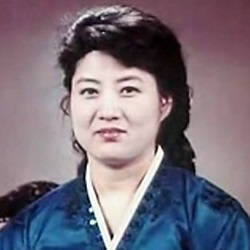New Book Reveals Untold Stories of Kim Jong-un's Mother, Ko Yong-hui

A new book titled ‘Ko Yong-hui: The Zainichi Korean Who Became Kim Jong-un's Mother’ is set to be published by Japan's Bungeishunjū at the end of June. Written by former Tokyo Shimbun editorial writer Go Mi Yōji, the book features previously unpublished photographs and testimonies about Ko Yong-hui (高容姬, 1952–2004), who was the mother of North Korean leader Kim Jong-un and the third wife of Kim Jong-il. Go, a journalist specializing in North Korea, previously published a book titled ‘My Father Kim Jong-il and I’ based on interviews and emails exchanged with Kim Jong-il's eldest son, Kim Jong-nam.
Among the revelations in the book is a photograph of Ko taken in 2004 while she was receiving treatment for terminal breast cancer in Paris, France. In the image, she is seen wearing a white fur hat and coat, being wheeled around by aides. She passed away in May of that year. The author suggests that Ko's concern for the succession struggle in North Korea led her to delay necessary surgery for her cancer, ultimately contributing to her death. The cancer first appeared in the early 1990s, during the competition for Kim Jong-il's successor, and Ko reportedly chose medication over surgery, fearing that treatment would distance her from Kim Jong-il's favor and jeopardize her children's safety.
Ko Yong-hui, who was a dancer with the Mansudae Art Troupe, became Kim Jong-il's wife in the mid-1970s and gave birth to three children: Kim Jong-chul, Kim Jong-un, and Kim Yo-jong. Kim Jong-un later competed for succession against Kim Jong-nam, the son of Kim Jong-il's second wife, Sung Hye-rim, and was officially named the successor in September 2010.
The book also includes family photos of Ko with her children, Kim Jong-chul and Kim Yo-jong, taken abroad in the 1990s. Previous analyses suggested that Ko enjoyed Kim Jong-il's favor and traveled internationally with her children using forged passports, and the newly released photos support this interpretation. It is reported that she frequently traveled on Kim Jong-il's private jet, known as 'No. 216' (named after Kim Jong-il's birthday on February 16), and utilized a bank account in Macau, China, for slush funds.
Additionally, the book reveals new anecdotes about Ko's family background. Born in Osaka, Japan, she returned to North Korea with her biological father, Ko Kyung-taek, at the age of ten in 1962. Interviews with Ko's half-brother indicate that their father had a complicated relationship with women. Initially, he intended to move to North Korea with his first wife and their seven children, but after facing strong opposition from his first wife's family, he left with his third wife and their children. He was involved in smuggling between Korea and Japan and decided to move to North Korea in the 1960s, believing it was more industrialized than South Korea at the time.
Experts on North Korea believe that Kim Jong-il had a special trust in Ko Yong-hui, discussing state policies with her even before Kim Il-sung's death. However, the North Korean regime has been reluctant to officially acknowledge Ko due to her Japanese origins and perceived issues with her background. The author posits that Kim Jong-un attempted to deify his mother after coming to power, but faced resistance from party officials, which may have led him to involve his daughter, Kim Ju-ae, more actively in public appearances. Furthermore, it is suggested that Kim Jong-un has a positive view of Japan, influenced by his mother's teachings, including learning the language, and does not harbor strong anti-Japanese sentiments.
What do you think?
1 reactions





